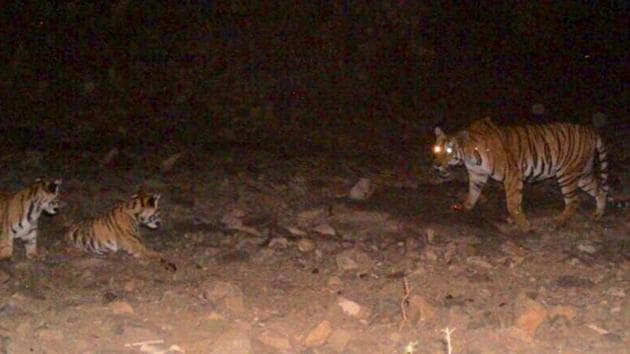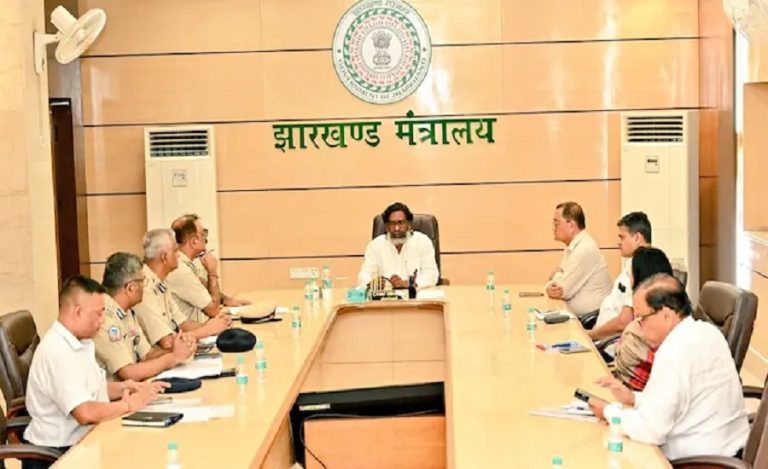Like a trained hound going after a scared rabbit, the hunter went after the tigress and her two cubs. At the same time a senior IFS officer, helped by over 200 team members from the Madhya Pradesh forest department, went about with a single aim of saving their lives. This is how the film `Sherni’, starring Vidya Balan and a host of versatile Bollywood actors, unfolds for better part of over two-hour long duration.
`Sherni’ holds a lot of lessons in conservation and wildlife management. It has already opened to rousing critical acclaim, but many in the media seemed to have overlooked the important points it makes.
For the first time perhaps, an Indian film has reached this far with its honest portrayal of man-animal conflict. It has touched upon the themes we all are quite aware of, namely the blocking of animal corridors with disastrous results for the wildlife, illegal felling of trees and jungles and appropriation of animals’ rights by unscrupulous politicians.
The film also has an uncanny resemblance to the 2018 killing of tigress Avni – allegedly a man-eater- in the Yavatmal district of Maharashtra. Shot down by a trophy hunter, Avni’s death triggered nationwide outrage among wildlife lovers and environmentalists and remains a black spot on otherwise commendable efforts to save our national animal from the path of extinction.

MORE THAN A THRILLER
`Sherni’ is a truthful depiction of how we view wildlife and forests. It’s an edge-of-the-seat kind of thriller but does not move with conventional pace. Rather, it draws you in- first slowly, and then with the force of a tornado- with its docu-drama style of presentation. Perhaps this was the best way to dish out the unvarnished truth for our jaded sensibilities. And director Amit Masurkar, who earlier gave us the superb `Newton’ with Rajkummar Rao and Pankaj Tripathi, has once again come out with a winner.
Senior IFS officer Mr Digvijay Singh Khati, who retired recently as the Principal Chief Conservator of Forests (PCCF)of Uttarakhand, is among those who feel that `Sherni’ holds several important lessons for us. For one, he told Indian Masterminds, “the film has reminded us that saving tiger as well as forests and other wildlife is not just the responsibility of the forest department but of all of us. Tiger being a national animal, it’s a national duty of all stake-holders, and that include elected representatives and well meaning individuals to work for its well being.’’
ROLE OF WELL-MEANING INDIVIDUALS
Actor Vijay Raaz, who plays the role of zoologist Hassan Noorani in `Sherni’, goes out of his way to propogate the message of environmental awareness. Holding street plays with dummy tigers is what he really likes, apart from collecting DNA samples of tigers. Says Mr Khati, “people like him (Noorani) who act as a bridge between the forest department and the people have a tremendous role to play. We need such individuals and well meaning organizations for success of our conservation projects, be it saving tigers or jungles.’’
NOTHING SURVIVES IN ISOLATION
`Sherni’ also makes another point: the tribal people’s symbiotic linkage with the forests. Mr Khati agrees that this is not an antagonist relationship. “In fact,’’ he points out, “a new realization is dawning that when it comes to landscape planning, humans have to be taken as a part of it. They cannot be excluded out of it.’’
Mr Khati is right. Nothing can survive in isolation: neither the forests not the people. They both are intrinsically attached with each other, each requiring the other for their survival.
Coming as it did in these days of pandemic and the mass shock-waves it has produced among people, `Sherni’ message of respecting environment will surely be picked up and appreciated by discerning viewers.

































